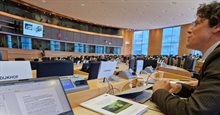Strategic autonomy of Europe and the EU
Elmer Rietveld, critical raw materials specialist at TNO: ‘Until a few years ago the topic of critical raw materials received little attention. The prevailing view back then was that globalisation would only make the world a better place. Even then, however, we knew that one day things could turn out very differently.’
‘And they did. The European Parliament is therefore currently doing all it can to identify vulnerabilities in this area. The strategic autonomy of the EU and Europe as a whole is now receiving a great deal of attention, including by developing knowledge on this topic.’
‘The stakes are therefore high. The European Union loses its strategic autonomy if we are fundamentally dependent on countries that violate international law. A shortage of critical raw materials not only jeopardises the energy transition, but also affects Europe’s capacity to innovate and thus our competitiveness.’

Elmer Rietveld, expert on raw materials and the circular economy, presenting the report to the European Parliament’s Committee on Industry, Research and Energy (ITRE).
Geopolitical tensions
‘As if all that were not enough, there are also moral dilemmas when it comes to critical raw materials,’ he continues. ‘After all, are these raw materials being extracted in a sustainable way? What are the working conditions like? And that’s before I’ve even come to the risk of geopolitical tensions. Meanwhile, Europe is all too aware that critical raw materials can also be used as a means of exerting pressure. So a policy on raw materials really is sorely needed.’
Securing supply through raw materials policy
The tricky thing about updating raw materials policies is that many companies within the European manufacturing industry have specialised in the production of complex devices, machines, or vehicles. For the supply of raw materials and components, they are very much reliant on large-scale value chains that often extend far beyond the continent.
‘For a long time that worked brilliantly,’ Rietveld reflects. ‘Now, unfortunately, we can no longer say that globalisation and free markets are good for everyone. Simply entering into collaborations anywhere in the world is no longer an option. We really need to develop a raw materials policy now. We need to properly examine which countries and chains can help us secure the supply of critical raw materials and the products containing them. That’s how we maintain our strategic autonomy.’
Industrial policy
‘And yes, that’s a huge task,’ he stresses. ‘It starts with the need for an industrial policy. Securing the supply of critical raw materials is not something you can always leave to the market. The United States is now taking the lead in this area with public action. The EU can do the same and the political will is there to do so.’
Presentation in Brussels
But what is really needed to prevent a shortage of critical raw materials and the products that contain them? That was the central question of a study that Rietveld conducted with a number of colleagues.
On 27 March 2023 they visited Brussels at the invitation of the European Parliament’s ITRE Committee to present their study. This committee deals with the energy transition and industrial policy of the EU and its Member States.
Rietveld: ‘In a nutshell, our main recommendation is to start strengthening the supply chain to the EU and supporting a competitive industrial ecosystem as soon as possible.
One element of this is stockpiling (building up additional stocks through policy incentives). On top of that, we simply need factories and people who can make stuff. A strong supply chain and industry are essential – not only so we can meet our energy transition goals, but also so we have strategic autonomy over critical raw materials. As the European Union, we must continue to play a vital role in supply chains between countries that adhere to the international rule of law.’
Stockpiling
To start with stockpiling, the TNO report recommends creating additional stocks in Europe of products containing critical raw materials, such as solar panels, machine components, optics, and mechatronics (systems incorporating mechanical as well as electronic and digital solutions).
By building up additional stocks of these types of products, European industry can be made more competitive. Rietveld: ‘Stockpiling policies should give buyers and wholesalers an incentive to hold larger stocks of products imported from outside the EU.
The recommendation here is to do business with companies in OECD (Organisation for Economic Cooperation and Development) countries wherever possible when sourcing. Holding such extra stock obviously costs money. However, when it comes to stockpiling, companies are not protesting, which shows that they understand the need.’
Creating an industrial ecosystem
Nevertheless, as mentioned above, we need to go much further. Many large manufacturing companies have already assigned people to the task of mapping out and optimising their supply chains.
‘That’s a good start, but to make a real impact Europe’s small and medium-sized enterprises (SMEs) also need to get involved. After all, the vast majority of companies are actually SMEs.
The problem is that these companies are often too small to take the matter in hand themselves. As a result, many of them lack a good insight into the risks posed by their supply chain. So far things are mostly going smoothly, but the concern is that rising geopolitical tensions will create additional pressure.
That’s why we are also advising Europe to help companies create an industrial ecosystem focusing on a reliable supply of critical raw materials and products containing them.’
Critical raw materials as a political weapon
So who should take the reins in all this? ‘Europe!’, says Rietveld with conviction. ‘For a long time governments adhered to the mantra that it’s better not to interfere too much with the markets. But it’s now clear that geopolitical forces can dramatically disrupt the free market. And everyone is aware that critical raw materials can be used as a political weapon to put pressure on other countries.’
‘So to ensure our strategic autonomy, we need to act quickly. But in a well-thought-out way, at European level, with companies working much more closely with each other when it comes to supply chains.’
‘The major challenge here is actually achieving absolute security of supply. After all, having 99 out of 100 parts is not enough. You need all of them. Fortunately, this realisation has now dawned on us. It’s terrible to see what is happening in Ukraine and elsewhere in the world, but these developments have made people recognise the importance of critical raw materials.’
Want to know more? Read the summary
Find out how this study provides an insight into European industry’s dependence on imports of critical raw materials and the possible solution in the form of EU storage facilities.



